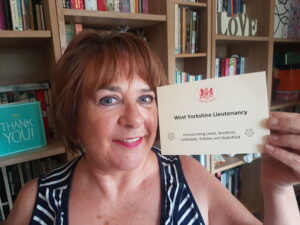
Our CEO, Julie Walker, founded Words For Wellbeing in 2016 after having worked in this field for over 15 years, 8 of which were as the bibliotherapist for Kirklees Libraries. Julie also has a clinical background as she was a community psychiatric nurse before gaining a Degree in Literature and beginning this work.
We facilitate sessions in hospitals, forensic psychiatric units, libraries, care homes, rehabilitation units, day centres and in various community settings.

Our bibliotherapy groups are not like a readers group where everyone has to read the same book; we use fiction, poetry and song lyrics as a jumping off point to start conversations and discussions that engage people, support their mental health and wellbeing and create a sense of connection and self- worth. Often there is laughter too.
Over many years we have developed and trialled different methods and resources in order to be able to work with people whether they are at the acute stage of their illness or in recovery, enabling us to access the person beneath their diagnosis. We do read aloud in our groups, but also use the written word in many different ways; if we only delivered sessions in one format our appeal would be limited and we would have fewer positive outcomes as groups would be in danger of becoming too formulaic.
Neither are we prescriptive in the way we work. We don’t just work with the classics but with chick lit, family sagas, song lyrics, modern poetry and everything else in between. Our experience has taught us that “one size does not fit all” , for example one person with depression might find a novel containing a character in it who is also experiencing depression might be very helpful, whereas another person experiencing depression might find that type of book is the last thing that they would want to read. So we tailor our work to fit the individual.
Our partners value the work we do as it is quite unique in that it is often reciprocal i.e. the participants are just as much an ‘expert’ as the bibliotherapist and the bibliotherapist often gets recommendations and insights from the participants. This is very good for the self- esteem of the participants.
The benefits of bibliotherapy to our beneficiaries are that it can help to :
One lady commented that she felt that she was getting to know herself better and realise who she is – she was remembering things that she had forgotten as they were so long ago – and had realised how they had shaped her as a person and she felt proud of how far she had come.
On an acute psychiatric admission ward they had had two incidents of violence during the morning and one new admission to the ward who had to be accompanied by the police. The atmosphere on the ward was tense. However, after the session one of the nurses said, “I didn’t think you’d even get a session going today never mind have so many taking part! The ward feels really different now, much more calm. Thanks – I’m on a late shift and was dreading the evening!”
The group is a focal point for clients to get to know each other better, share ideas, opinions and generally have conversations with each other and staff that they would not normally have. Comment for a member of staff on a rehabilitation unit.
‘They’re good them sessions aren’t they? Make you think’. T
‘It’s took me mind off me troubles for a bit. I’ve got a lot of them.’ M
‘I really appreciate you found me the words to the song Dignity by Deacon Blue. Thank you for remembering and printing them for me.’ S

We facilitate sessions in hospitals, forensic psychiatric units, libraries, care homes, rehabilitation units, day centres and in various community settings.
Awards.
SEYH (Social Enterprise Yorkshire and Humber Start Up Winner 2018.
Card from Lord Lieutenancy.
Global Health & Pharma Mental Health Awards 2022 winner of Bibliotherapy Specialist of the Year (UK) : Julie Walker